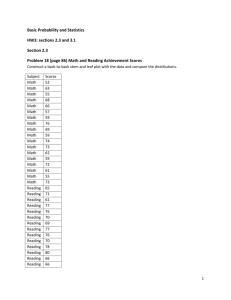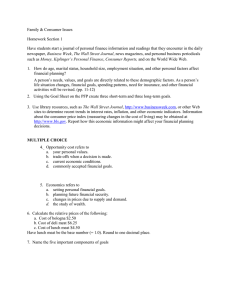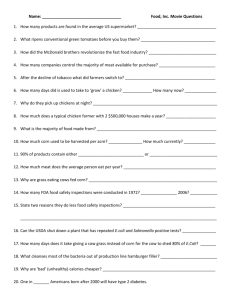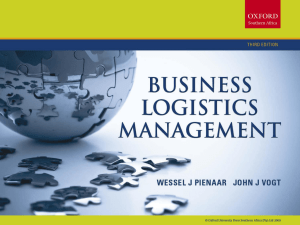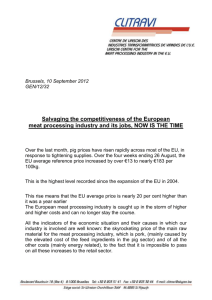Meat Industry Turmoil
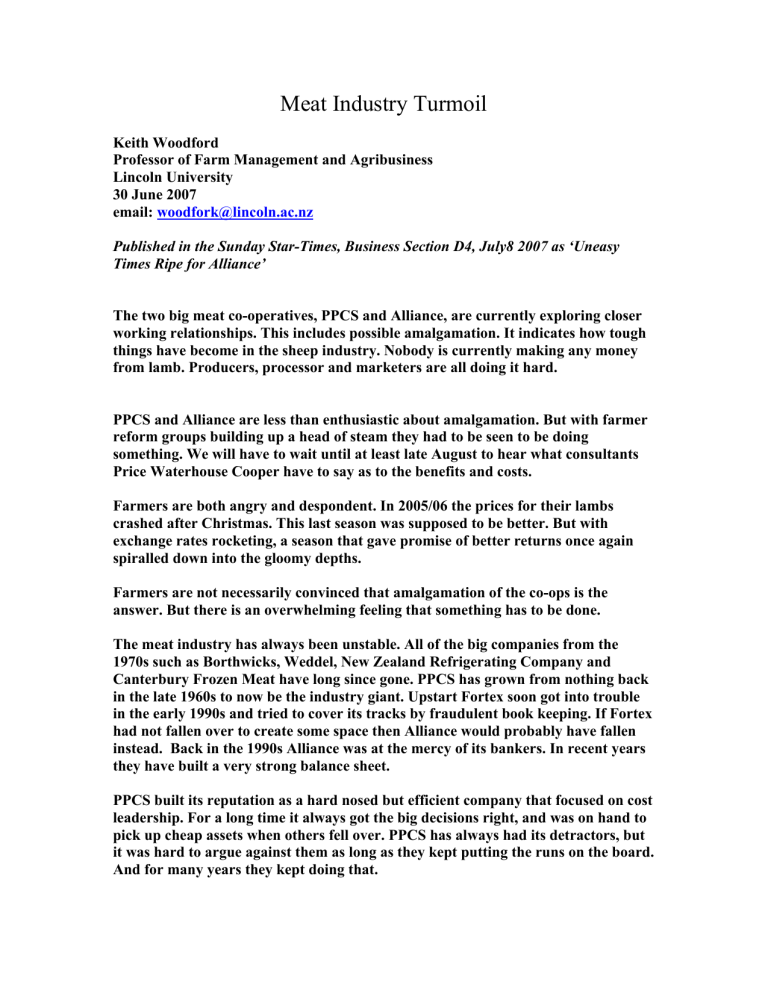
Meat Industry Turmoil
Keith Woodford
Professor of Farm Management and Agribusiness
Lincoln University
30 June 2007 email: woodfork@lincoln.ac.nz
Published in the Sunday Star-Times, Business Section D4, July8 2007 as ‘Uneasy
Times Ripe for Alliance’
The two big meat co-operatives, PPCS and Alliance, are currently exploring closer working relationships. This includes possible amalgamation. It indicates how tough things have become in the sheep industry. Nobody is currently making any money from lamb. Producers, processor and marketers are all doing it hard.
PPCS and Alliance are less than enthusiastic about amalgamation. But with farmer reform groups building up a head of steam they had to be seen to be doing something. We will have to wait until at least late August to hear what consultants
Price Waterhouse Cooper have to say as to the benefits and costs.
Farmers are both angry and despondent. In 2005/06 the prices for their lambs crashed after Christmas. This last season was supposed to be better. But with exchange rates rocketing, a season that gave promise of better returns once again spiralled down into the gloomy depths.
Farmers are not necessarily convinced that amalgamation of the co-ops is the answer. But there is an overwhelming feeling that something has to be done.
The meat industry has always been unstable. All of the big companies from the
1970s such as Borthwicks, Weddel, New Zealand Refrigerating Company and
Canterbury Frozen Meat have long since gone. PPCS has grown from nothing back in the late 1960s to now be the industry giant. Upstart Fortex soon got into trouble in the early 1990s and tried to cover its tracks by fraudulent book keeping. If Fortex had not fallen over to create some space then Alliance would probably have fallen instead. Back in the 1990s Alliance was at the mercy of its bankers. In recent years they have built a very strong balance sheet.
PPCS built its reputation as a hard nosed but efficient company that focused on cost leadership. For a long time it always got the big decisions right, and was on hand to pick up cheap assets when others fell over. PPCS has always had its detractors, but it was hard to argue against them as long as they kept putting the runs on the board.
And for many years they kept doing that.
More recently PPCS played a hard game to take over North Island company
Richmond. In fact PPCS overstepped the mark and ended up being fined many millions for breaking the law. It erred in secretly building up a large stake using nominees. But PPCS still won out, despite the fines, and having to take on huge debt to finance the purchase.
And that is part of the PPCS problem. They are now the biggest NZ lamb processor by a long way, but they are saddled with debt. Currently their bonds are yielding about 19% which indicates that the market is nervous. Also, PPCS has announced that this year it will not meet its banking covenants. It will need to seek an accommodation from its bankers. This is not to suggest that PPCS is likely to fall over, but its position is less than comfortable.
Of course there are many other players in the lamb business apart from the two big co-operatives. AFFCO is the next biggest and then there are a myriad of smaller firms. AFFCO also used to be a co-operative but now is a publicly listed company with majority shareholding by the Talley family. The Talleys are also major players in the fishing industry. They do things their own way. And then there is ANZCO, majority Japanese owned, and apparently well managed.
The meat companies have always been quick to blame each other when things go wrong in the market place. This year it is AFFCO that seems to be getting the blame. One marketer has told me that his European clients keep trying to push down the price by claiming that AFFCO has product at a cheaper price. But is it true? No-one knows. And that is part of the problem: there is a lack of co-ordination in the European market and the European supermarkets play the NZ meat companies off against each other.
Bringing to the cooperatives together may not be easy. Why would Alliance, which has a strong balance sheet, want to link with the considerably bigger PPCS which has a weak balance sheet? And what would it actually achieve? It would achieve some marketing savings, and it might reduce the stock procurement battles that break out periodically. It would also reduce competition.
There may actually be smarter ways to achieve market co-ordination without formal amalgamation. In many markets there is nothing to stop the companies working together. For example Alliance, ANZCO and Richmond worked together for many years in the US through the NZ Lamb Company, and now PPCS are folding their US marketing operations into this company. It makes a lot of sense.
The lamb industry is always going to be a difficult industry. Mother Nature says that lambs should be born in spring. This means that prior to Christmas the meat companies are short of stock to slaughter and they compete with each other for whatever is available. Then in the New Year find they themselves overstretched.
With farmers desperate for killing space, the companies can drop their prices. This
is the time of the year that the meat companies use to cover their overheads and make a profit.
From an economic perspective this seasonal pricing makes a lot of sense. But it is hated by many farmers. And the meat companies have deservedly drawn criticism upon themselves through a lack of transparency in their pricing structures, and not signalling their pricing intentions ahead. Small and medium farmers are also highly critical of secret bonuses paid to large scale suppliers.
Of course a lot of the current problems in the lamb industry have nothing to do with the meat companies. It is not their fault that the dollar is so high. And it is not their fault that Mother Nature serves up a different sized lamb crop every year. The reality is that it would not matter what the industry structure was, this industry was always going to struggle in 2007 with the high foreign exchange rates.
Farmers also have to take some of the blame. In the past the co-ops have been characterised by strong management but weak governance. It is the farmer members, through the directors they appoint, who are responsible for governance.
And there have been too many directors who have lacked the drive to rattle the cage and bring the meat industry into the 21 st
century. If the current farmer-led reform movement leads to re-invigoration of the co-op Boards then it will have served a useful purpose.
****
